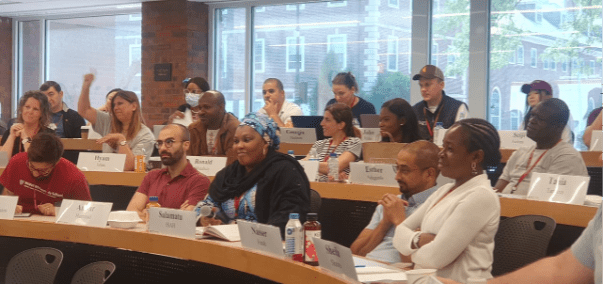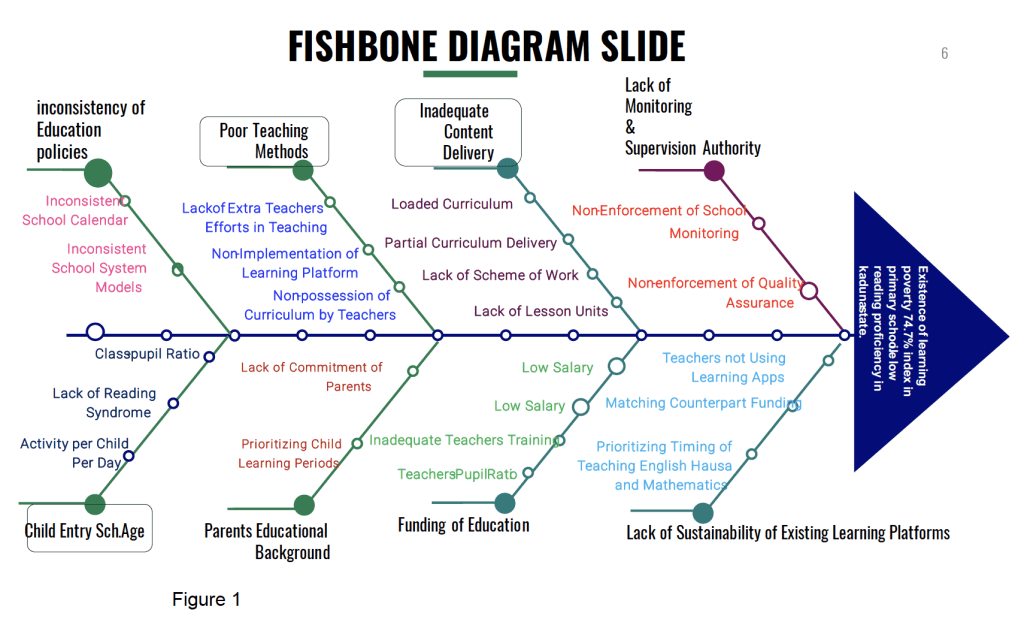Guest blog by Salamatu Idris Isah, IPP ’23
PDIA: Learning by Doing and Getting it Right
Working in a public space has never been easy, especially when you are saddled with the responsibility of making sure everything you proposed, that has been adopted, has a developmental impact. My participation in the 2023 IPP course was an eye-opener, as we were introduced to the Problem-Driven Iterative Adaptation (PDIA) Concept. Taking a step to identify a problem challenge such as Eliminating Learning Poverty as a means of “Improving reading proficiency and Learning outcomes among primary school pupils in Kaduna State, Nigeria” and wanting to navigate through the PDIA processes to find solutions is an inspiration for me every day throughout the course.
I remember the first day we all arrived in Boston and stepped into a classroom at Harvard Kennedy School of Government, with all the participants at the end of that day wanting to be change agents. I could see the enthusiasm with which each one of us took part in the classroom discussions on constructing and deconstructing the problem challenge!

Some of the key learning from the course are enormous, i.e., from the group assignments and individual assignments, live sessions, and iterative sessions. Conceptualizing some of the key concepts such as functionality, legitimacy, multiple levers of leadership, the 5whys, Triple-A, and the 4Ps have helped me to understand what the IPP module is all about. The iterative sessions offer lessons and gains that drive the next steps/actions to take. The step-by-step process of building functionality and gaining legitimacy has helped identify key stakeholders as connectors, conveners, implementers, and Authorizers. Thus, the context of the discussion and outcome of the iterative sessions have helped navigate key organizations and support from individual stakeholders which I initially considered with a high degree of uncertainty on leadership support and implementation. Throughout my learning sessions, sharing knowledge and learning from others has been an effective strategy for me. It has helped me grow and paved the way for new ideas and capabilities. I have improved my skills in leadership roles, delegation, and task assignments. For example, I updated my fishbone diagram three times based on new ideas generated by my support team members.

During the course, I had more insight into my problem challenge. The issue oflearning poverty and low learning outcomes is a major Challenge in Nigeria and all its 36 States. Since 2018, mapping of Out of out-of-school children has been done as a way of resolving critical factors that are associated with Child education development in Kaduna State. Projects such as the Provision of Intensive Literacy, Reading and Numeracy (RANA), and Teaching at the Right Level (TaRL) have all been Initiated to address the learning gap. The TaRL is a model adopted from India in 2021 as standard best practice. Thus, I have decided to leverage on these External Best Practice (EBP) Models and scale up to other Local Government Councils. The State has built capabilities and has empowered teachers and staff at the State Ministry of Education and the State Universal Basic Education Board during the project. The narrative on the existence of some previous programs to improve child education development and learning outcomes gave me a hit that the team and I can understudy the impact made so far and how we can come in using the PDIA approach to proffer Solutions. It is worth mentioning here that the existing learning poverty issue has attracted debate on how to eliminate it but the reasons the problem fester is reflected in the Fishbone Diagram. The main factors include inconsistency in education policies, Poor teaching Methods, Inadequate content delivery, Lack of monitory and supervision Authorities in Schools, Child Entry School Age, Poverty, Parent Education Background, and lack of sustainability of existing learning platforms, etc.
Thus, having the shared knowledge and the support of my committed Team, I think the PDIA approach will help me to change the narrative in the future, and use it even in similar problem challenges. As a former Advisor on Economic Matters, I will scale up my Authorization and communicate my day-to-day activities with the higher Authority on the progress made in each of my iterative sessions with stakeholders and education policy implementers. Gaining more support in the next few weeks or months will provide an avenue for the team and me to make a presentation of our findings, strategies, and implementation Plan on how to improve reading Proficiency and learning outcomes in Kaduna state. In the last two weeks, I have made progress, the quick wins to reflect on is The Acceptance and Authorization by the Director of Human Resources, at the State Universal Basic Education and the Commissioner of Education to facilitate more engagement with other key stakeholders in the state. This is a big win; I am looking forward to it and the next steps to take.
This is a blog series written by the alumni of the Implementing Public Policy Executive Education Program at the Harvard Kennedy School. 47 Participants successfully completed this 7-month hybrid program in December 2023. These are their learning journey stories.
